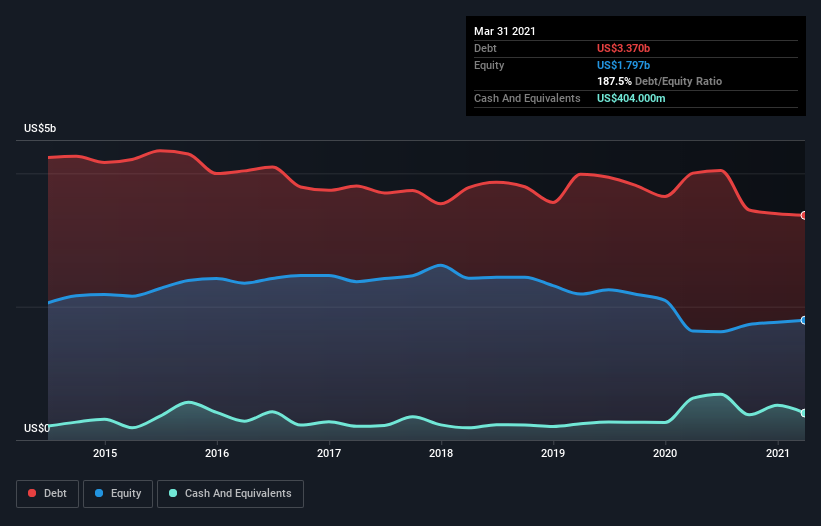- United States
- /
- Real Estate
- /
- NYSE:HOUS
These 4 Measures Indicate That Realogy Holdings (NYSE:RLGY) Is Using Debt Extensively

Some say volatility, rather than debt, is the best way to think about risk as an investor, but Warren Buffett famously said that 'Volatility is far from synonymous with risk.' So it seems the smart money knows that debt - which is usually involved in bankruptcies - is a very important factor, when you assess how risky a company is. We can see that Realogy Holdings Corp. (NYSE:RLGY) does use debt in its business. But should shareholders be worried about its use of debt?
What Risk Does Debt Bring?
Debt is a tool to help businesses grow, but if a business is incapable of paying off its lenders, then it exists at their mercy. If things get really bad, the lenders can take control of the business. However, a more usual (but still expensive) situation is where a company must dilute shareholders at a cheap share price simply to get debt under control. Of course, debt can be an important tool in businesses, particularly capital heavy businesses. When we think about a company's use of debt, we first look at cash and debt together.
Check out our latest analysis for Realogy Holdings
How Much Debt Does Realogy Holdings Carry?
You can click the graphic below for the historical numbers, but it shows that Realogy Holdings had US$3.37b of debt in March 2021, down from US$4.00b, one year before. However, it does have US$404.0m in cash offsetting this, leading to net debt of about US$2.97b.

How Strong Is Realogy Holdings' Balance Sheet?
We can see from the most recent balance sheet that Realogy Holdings had liabilities of US$869.0m falling due within a year, and liabilities of US$4.23b due beyond that. Offsetting these obligations, it had cash of US$404.0m as well as receivables valued at US$274.0m due within 12 months. So its liabilities outweigh the sum of its cash and (near-term) receivables by US$4.42b.
This deficit casts a shadow over the US$2.06b company, like a colossus towering over mere mortals. So we'd watch its balance sheet closely, without a doubt. At the end of the day, Realogy Holdings would probably need a major re-capitalization if its creditors were to demand repayment.
In order to size up a company's debt relative to its earnings, we calculate its net debt divided by its earnings before interest, tax, depreciation, and amortization (EBITDA) and its earnings before interest and tax (EBIT) divided by its interest expense (its interest cover). This way, we consider both the absolute quantum of the debt, as well as the interest rates paid on it.
Realogy Holdings's debt is 4.2 times its EBITDA, and its EBIT cover its interest expense 2.8 times over. Taken together this implies that, while we wouldn't want to see debt levels rise, we think it can handle its current leverage. On a lighter note, we note that Realogy Holdings grew its EBIT by 28% in the last year. If sustained, this growth should make that debt evaporate like a scarce drinking water during an unnaturally hot summer. The balance sheet is clearly the area to focus on when you are analysing debt. But it is future earnings, more than anything, that will determine Realogy Holdings's ability to maintain a healthy balance sheet going forward. So if you're focused on the future you can check out this free report showing analyst profit forecasts.
Finally, while the tax-man may adore accounting profits, lenders only accept cold hard cash. So it's worth checking how much of that EBIT is backed by free cash flow. Over the last three years, Realogy Holdings recorded free cash flow worth a fulsome 97% of its EBIT, which is stronger than we'd usually expect. That positions it well to pay down debt if desirable to do so.
Our View
We feel some trepidation about Realogy Holdings's difficulty level of total liabilities, but we've got positives to focus on, too. To wit both its conversion of EBIT to free cash flow and EBIT growth rate were encouraging signs. When we consider all the factors discussed, it seems to us that Realogy Holdings is taking some risks with its use of debt. While that debt can boost returns, we think the company has enough leverage now. There's no doubt that we learn most about debt from the balance sheet. But ultimately, every company can contain risks that exist outside of the balance sheet. To that end, you should learn about the 3 warning signs we've spotted with Realogy Holdings (including 1 which doesn't sit too well with us) .
At the end of the day, it's often better to focus on companies that are free from net debt. You can access our special list of such companies (all with a track record of profit growth). It's free.
When trading Realogy Holdings or any other investment, use the platform considered by many to be the Professional's Gateway to the Worlds Market, Interactive Brokers. You get the lowest-cost* trading on stocks, options, futures, forex, bonds and funds worldwide from a single integrated account. Promoted
New: Manage All Your Stock Portfolios in One Place
We've created the ultimate portfolio companion for stock investors, and it's free.
• Connect an unlimited number of Portfolios and see your total in one currency
• Be alerted to new Warning Signs or Risks via email or mobile
• Track the Fair Value of your stocks
This article by Simply Wall St is general in nature. It does not constitute a recommendation to buy or sell any stock, and does not take account of your objectives, or your financial situation. We aim to bring you long-term focused analysis driven by fundamental data. Note that our analysis may not factor in the latest price-sensitive company announcements or qualitative material. Simply Wall St has no position in any stocks mentioned.
*Interactive Brokers Rated Lowest Cost Broker by StockBrokers.com Annual Online Review 2020
Have feedback on this article? Concerned about the content? Get in touch with us directly. Alternatively, email editorial-team (at) simplywallst.com.
About NYSE:HOUS
Anywhere Real Estate
Through its subsidiaries, provides residential real estate services in the United States and internationally.
Undervalued with moderate growth potential.
Similar Companies
Market Insights
Community Narratives



